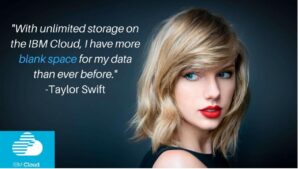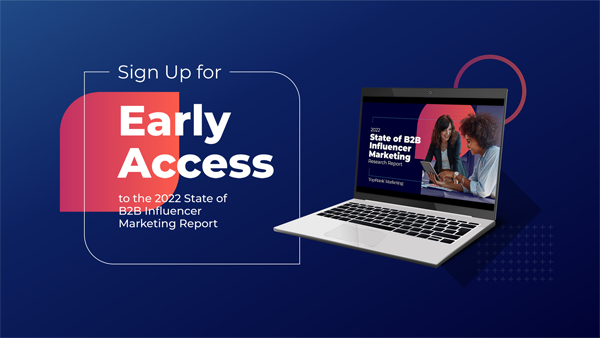
B2B marketers are always being told to borrow tactics from B2C. But imagine if B2B companies practiced influencer marketing the way B2C brands do. You pick a star with a huge following on social media, pay them to promote your product, and get a ton of reach…

…and I’ll write your name.
It’s easy to see why this tactic wouldn’t work. No offense to Ms. Swift, but only a sliver of her followers are likely to be in the market for a new SaaS solution. More to the point, Taylor’s audience doesn’t come to her for business suggestions. She has the reach, but not the relevance.
So, can influencer marketing work for B2B?
Anyone even a little familiar with our agency will know that we’re all-in on B2B influencer marketing. We do believe it works, and we have a proven track record of success with it.
But we wanted to see how B2B influencer marketing is developing beyond TopRank Marketing. What are other marketers doing, and what kind of results are they seeing?
We’ll be releasing our official 2022 State of B2B Influencer Marketing report very soon (click here to sign up for early access), but here’s a sneak peek at what we found.
Yes, B2B Influencer Marketing Works
Here’s the big takeaway: 86% of our respondents said their influencer program is successful. Almost as many, 85%, say they expect interest in influencer marketing will continue to increase in the coming year.
Marketers are seeing success through the entire funnel with influencer marketing. A majority saw improvement in awareness and reach, and a third of respondents said they’ve even seen increased sales and revenue from the tactic.
We know that B2B influencer marketing works.
But as marketers, our next question when something works is always:
How do we make it work better?
What’s Holding B2B Influence Back?
As successful as these programs have been for our respondents, there are challenges to overcome. Some are procedural: The manual tasks of finding and nurturing influencers can be challenging to scale. There are tools in the marketplace that make these tasks more efficient, but few marketers are taking full advantage of what’s out there.
More troubling are the strategic challenges: Less than half of respondents say they have a documented strategy. Nearly 25% say they have no strategy at all! Random Acts of Influencer Marketing are unlikely to achieve the kind of results marketers are looking for.
It’s clear that B2B marketers need to increase their level of sophistication as they seek to optimize and scale their influencer marketing operation.
It’s Time to Get Sophisticated
Break out the monocle and top hat — it’s time to look at the sophisticated methods of the most successful B2B influencer marketers. Having a documented strategy and making good use of tools (or employing an agency for both, cough cough) are both ways to up your maturity level.
Another major component is refining your criteria for an influencer. We found that marketers are leaning away from sheer size of audience as a deciding factor, relying instead on relevance and resonance as key qualifiers. After all, would you rather reach 100,000 people including 15 potential prospects, or 1,000 people with 50 potential prospects?
When you look at reach and relevance first, it broadens the definition of who can be an influencer. It could be the practitioner with a ton of industry experience, the analyst with a broad overview of the industry, your company’s executive suite, and even your employees on the front lines.
Always-On Is a Recipe for Success
One of the most dramatic differences we saw was between those who run periodic influencer campaigns, and those who take an always-on approach to nurturing and creating content with influencers.
Always-on folks were more likely to report they were very or moderately successful — 31% of always-on said very successful, vs. 19% of campaigners. Even more compelling is that 24% of campaigners said their marketing was not successful, compared to… zero percent of always-on folks. That’s right — 100% of our always-on respondents are seeing success.
B2B Influencer Marketing Works… And It Can Work Even Better
Our team at TopRank Marketing is committed to elevating B2B influencer marketing. We believe that influence is an essential part of a good marketing mix, and we include influencers in as much co-created content as we can.
Case in point: Our upcoming 2022 State of B2B Influencer Marketing report features experts with off-the-charts resonance and relevance for any B2B marketer, including practitioners from brands like LinkedIn, Smartsheet, SAP, and Demandbase.
Sign up now to get early access to the full report.



